- NYSG welcomes three fellows from New York universities into the 43rd class of Sea Grant’s highly competitive John A. Knauss Marine Policy Fellowship;
- Another fellow is also in the latest class of the National Marine Fisheries Service (NMFS) – Sea Grant Joint Fellowship Program;
- Also, NYSG catches up with its 2021 Knauss Fellows
New York, NY, February 14, 2022 — New York Sea Grant (NYSG) welcomes three fellows from New York universities into the 43rd class of Sea Grant’s highly competitive John A. Knauss Marine Policy Fellowship (Knauss Fellowship). Giselle Schmitz, Liang Wu, and Celeste Zumwalt are among 68 fellows placed in federal government offices in Washington, D.C. for one-year fellowships that began earlier this month.
“We are truly excited to introduce Giselle, Liang, and Celeste and to welcome them to the New York Sea Grant family,” said Becky Shuford, NYSG Director. “Each bring unique interests and perspectives from their diverse focuses of study, and their multifaceted experiences, knowledge, and vision for the future of sustainable and resilient coastal and marine communities and resources is impressive and inspiring. They have already made an impact and based on their successes to date I am confident their contributions will continue to grow through the Knauss Fellowship and beyond.”
The Knauss Fellowship program gives early career professionals the opportunity to gain a hands-on experience transforming science into policy and management. To date, the Fellowship has helped 1,500 fellows (approximately 50 of whom are from New York) advance their careers in science, policy, and public administration.
NYSG’s three finalists participated in placement week this past fall to interview with potential host offices in the executive branches of U.S. government. Through this Fellowship, finalists are able to expand their skills and learn from government offices that focus on coastal, marine, and Great Lakes science and policy.
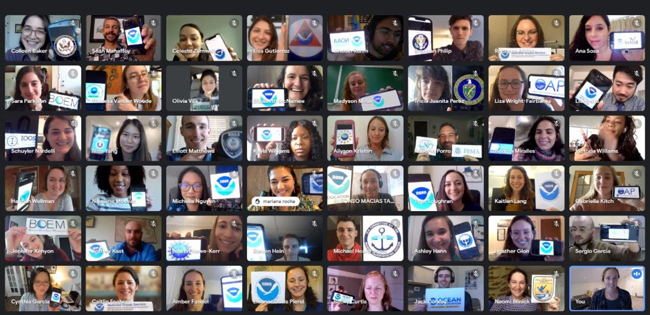
51 executive fellows in the 2022 class of the Knauss Fellowship secured placements for their fellowship year. The finalists were placed in offices across NOAA and other federal agencies during Sea Grant's virtual Placement Week, held in October 2021. The now-fellows celebrated their placements by taking a group photo alongside the logos for their host offices. This includes three from New York — Giselle Schmitz (National Oceanic and Atmospheric Administration's National Marine Fisheries Service — Office of Science and Technology), Liang Wu (NOAA's Office of Ocean Exploration and Research), and Celeste Naoko Zumwalt (NOAA HQ — Office of the Under Secretary).
Getting to Know NYSG’s 2022 Knauss Finalists
Giselle Schmitz

“I graduated from Walla Walla University in Washington where I studied English Literature and minored in Biology. Then I went to the University of Oregon for law school where I focused on Ocean and Coastal Law and International Environmental Law. Now I am studying for my master’s in International Political Economy and Development at Fordham University,” said Schmitz.
“The Knauss Fellowship is a great opportunity for exposure to what scientists are currently working on and how policy interventions can be most effective. This is such a timely point in our careers to be exposed to that and for us to be able to gain interdisciplinary connections. I have focused my recent studies on the economic drivers for both small-scale and commercial fisheries. In the future, I hope to work in conservation criminology, focusing on the nexus of law, economics and marine science in order to study sustainable small-scale fisheries and marine protected areas. During this Fellowship, I hope to gain exposure to marine science best practices and effective approaches to science-driven policy solutions – gaining more practice and experience in that so I can be ready for the next step in my career.”
Liang Wu

“I am very grateful and honored to be selected as a finalist for the Knauss Fellowship. Currently, I am a Ph.D. candidate at the City University of New York studying Anthropology. I received a Masters of Philosophy in Anthropology at the Chinese University of Hong Kong and also got my undergraduate degree in Anthropology at the same school. My research-based education focuses on maritime issues within the international shipping and seafarer industry. I’ve come to realize the paramount role of marine policy in affecting the environment and people’s livelihoods, including the lives of 1.6 million seafarers that are responsible for shipping across the globe. I am invested in learning about international law and the lives of seafarers - how they navigate their ships and overseas relationships,” said Wu.
“As we are figuring out climate change and economic recovery, I really want to devote myself to serving and making a difference in the world through the Knauss Fellowship and beyond. I feel I can contribute my social science and cross-cultural perspectives to the Knauss program and hope to advise and perhaps help carry out effective policies into the world. This is a great opportunity to put my maritime knowledge, experience, and passion into practice.”
Celeste Zumwalt

“I received my bachelor’s degree in History from Wellesley College. Most recently, I graduated from Columbia University’s School of International and Public Affairs and received an MPA in Environmental Science and Policy,” said Zumwalt.
“My interest in climate policy stems from growing up in a drought in Southern California. Oceans often play a role in influencing drought development and climate change is only making this worse. My educational journey led me to learn more about the impact of our oceans across the board. Whether it be national security concerns arising in the melting Arctic, or sea-level rise impacting our local communities and military bases along our coastlines, our oceans play a huge role in this. Through the Knauss Fellowship, I aim to learn more about how the federal government operates and how international policy falls within that framework. In addition, I look forward to furthering my knowledge in this field so I can become a well-informed policy advisor in the future.”
Checking in with NYSG’s 2021 Knauss Fellows
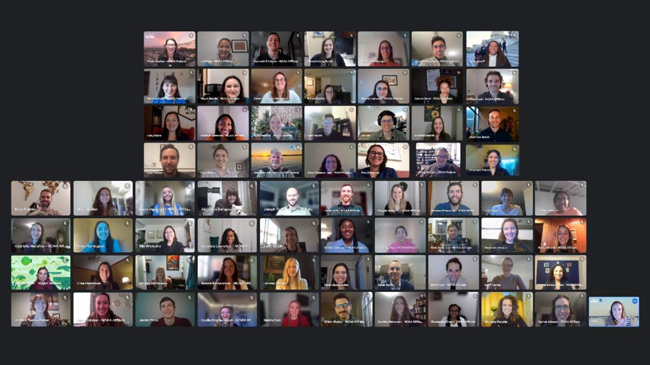
In late January 2022, Sea Grant (virtually) celebrated the 2021 Knauss Fellows and their successful completion of year-long fellowships in federal government offices.
Last year, NYSG announced Tammy Bleier and Maya Whalen-Kipp as NYSG’s 2021 Knauss finalists. NYSG checked in with them to see how their experiences have been thus far with the Fellowship:
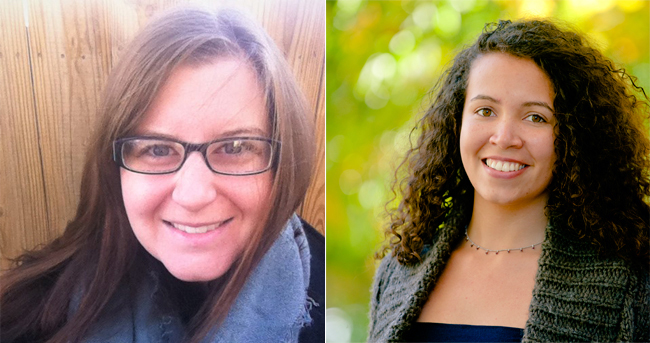
Tammy Bleier (above, at left) worked in NOAA Research's Office of International Activities. “I've been able to engage in high-level policy discussions on the Galway Statement and All-Atlantic Ocean Research Alliance with nations throughout the Atlantic basin. In addition, I served on the US delegation to the Intergovernmental Oceanographic Commission (IOC) Assembly to support and advance US ocean-related priorities globally. These hands-on experiences have provided a unique opportunity to learn about international negotiations, decision making, and relationship building,” stated Bleier.
“The Fellowship has been a rewarding, challenging, and exciting experience that will undoubtedly prove useful in my career. I've learned about policy and decision making, but also important and transferable skills such as leadership, communication, and strategic planning. The Fellowship has helped me get out of my comfort zone and gain skills that will help me in my next chapter, wherever that takes me.”
Maya Whalen-Kipp (above, at right) was the Marine & Energy Interagency Coordinator for the DOE Wind Energy Technology Office and Water Power Technology Office. “Through this Fellowship, I have gained hands on experience in understanding how innovative technology gets funded by the federal government and am working with phenomenal people who are thinking very critically on how we can support a just renewable energy transition,” said Whalen-Kipp.
“The Knauss Fellowship is valuable for my career as it has allowed me to learn how the federal government functions and explore novel marine energy topics and technologies. My experience here is valuable for my professional career transition from environmental academia to real applications of ocean renewable energy development. I hope to now continue in the field for the foreseeable future.”
National Lens on the Knauss Fellowship
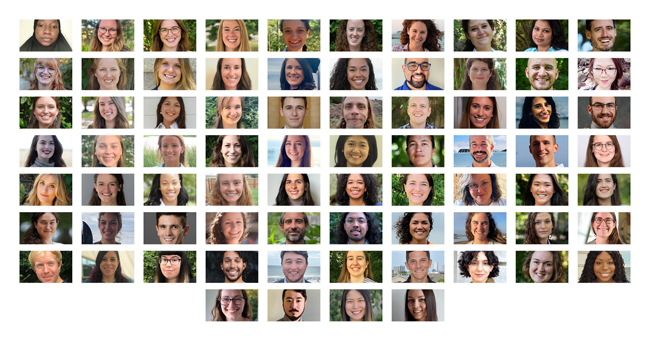
In mid-July 2021, NOAA and the National Sea Grant College Program announced the finalists for the 2022 class of the Sea Grant John A. Knauss Marine Policy Fellowship program. Knauss finalists are students that are enrolled in or have recently graduated from a master’s, Juris Doctor (J.D.), or Doctor of Philosophy (Ph.D.) program with a focus in marine and coastal science, policy or management. Students apply to one of the 34 Sea Grant programs and are selected through a comprehensive review at both the state Sea Grant program and national levels.
The National announcement provides words from the National Sea Grant College Program Director about the Fellowship; “At both the state and national levels, Sea Grant’s active recruitment and student engagement efforts supported one of the most robust applicant pools in Fellowship history,” said Jonathan Pennock, Ph.D., National Sea Grant College Program Director. “I have no doubt that the finalists’ diverse perspectives will provide great insight towards addressing critical marine policy and science challenges. We look forward to welcoming the 2022 class of Knauss fellows.”
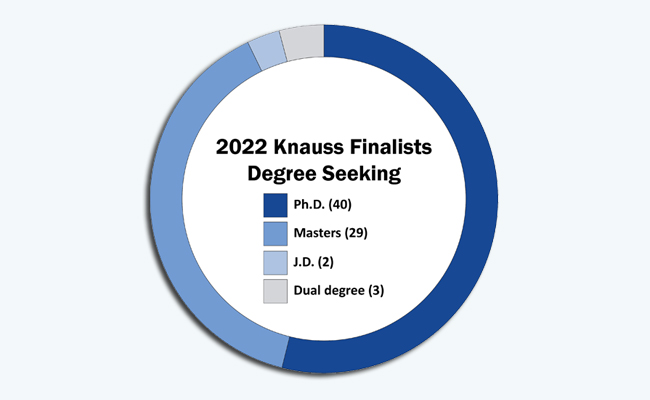
Within the 2022 class of Knauss finalists, 40 finalists completed Ph.D. programs, 29 finalists completed master’s programs, 2 finalists completed J.D. programs and 3 finalists completed dual graduate degree programs.
As noted in the National announcement, the 2022 Knauss finalists are students and recent graduates from 51 distinct universities, including 11 minority-serving institutions, that studied in fields such as agronomy, anthropology, ecology, environmental policy and law, fisheries, geology, marine and coastal sciences, several disciplines of oceanography, tourism management, and urban and regional planning. Numerous finalists are multilingual, some of whom grew up and studied in countries outside of the U.S. while others engaged in study and experiences abroad. The 2022 Knauss finalists also functioned as educators, mentors and volunteers; worked in international, national and state political offices; and engaged with scientific research at NOAA and other federal agencies. The Fellowship is bringing together science communicators and artists who have the skills and passion to translate research to broad applications.

By The Numbers: Knauss (pdf) and National Marine Fisheries Service-Sea Grant (pdf) Fellowship Programs (last updated, respectively, September and October 2021)
Other Fellowship Announcements
National Marine Fisheries Service (NMFS) – Sea Grant Joint Fellowship Program
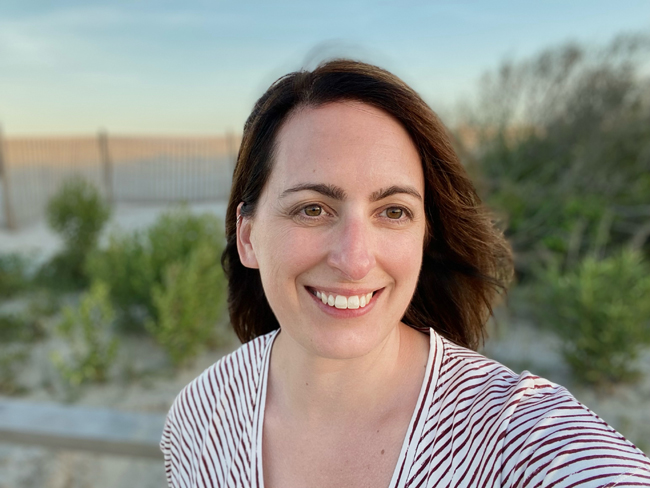
Last summer, Janelle Morano was named as New York Sea Grant’s 2021 fellow of the National Marine Fisheries Service (NMFS) – Sea Grant Joint Fellowship Program. Through this program, NMFS and Sea Grant provide support to Ph.D. students studying population and ecosystem dynamics and marine resource economics. Janelle is one of seven fellows that began their three-year fellowship ahead of fall 2021.
“We congratulate Janelle on her selection to the highly competitive NMFS-SG Fellowship. Janelle is one of five who applied for a 2021 Fellowship in Population and Ecosystem Dynamics – from a pool of 38,” said Becky Shuford, NYSG Director. “Her research, along with that of the other six Fellows, will provide important knowledge to support sustainable marine resource management and conservation.”
Janelle Morano
“For my undergrad, I went to Boston University where I received a degree in Biology with a concentration in Marine Biology. I also received a master’s degree in Biology at Loyola University Chicago, and now I am studying at Cornell University for my Ph.D. in fisheries management in the Department of Natural Resources and the Environment,” stated Morano.
“I’ve always had an interest in fish. The driving questions for me are where are they and where do they go but also why – what are the ecological influences that determine their preferred habitat and what changes are happening in the context of climate change. I wanted to focus my research on how we can adapt our fisheries management strategies to account for climate change and the changing ocean ecosystem. It can be difficult to predict the future, but it is important to adapt models and surveys to take into account new ranges and distribution as fish respond to the changes in our oceans. If we can understand this then we can create a more prepared society. Being awarded the fellowship feels great as it recognizes the research I am conducting. I look forward to connecting with people that are doing similar work in their research and want to learn more about how NOAA leads and collaborates in fisheries management in the U.S. and internationally.”
More Info: New York Sea Grant
New York Sea Grant (NYSG), a cooperative program of Cornell University
and the State University of New York (SUNY), is one of 34 university-based
programs under the National Oceanic and Atmospheric Administration’s
National Sea Grant College Program.
Since 1971, NYSG has represented a statewide network of integrated
research, education and extension services promoting coastal community
economic vitality, environmental sustainability and citizen awareness
and understanding about the State’s marine and Great Lakes resources.
Through NYSG’s efforts, the combined talents of university scientists
and extension specialists help develop and transfer science-based
information to many coastal user groups—businesses and industries,
federal, state and local government decision-makers and agency managers,
educators, the media and the interested public.
The program maintains Great Lakes offices at Cornell University, University at Buffalo, SUNY Oswego and the Wayne County Cooperative Extension office in Newark. In the State's marine waters, NYSG has offices at Stony Brook University and Cornell Cooperative Extension of Nassau County on Long Island; at Brooklyn College, with New York City Department of Environmental Protection in Queens and at Cornell Cooperative Extension in NYC and Elmsford and Kingston in the Hudson Valley.
For updates on Sea Grant activities: www.nyseagrant.org has RSS, Facebook, Twitter, Instagram, and YouTube links. NYSG offers a free e-list sign up via www.nyseagrant.org/nycoastlines for its flagship publication, NY Coastlines/Currents, which is published quarterly.